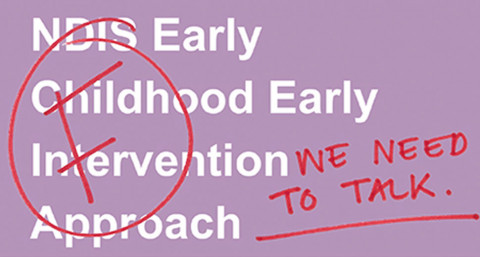
You might have noticed that talk of children with autism and the NDIS is everywhere today – including some pretty angry commentary. Here’s a look at what’s happened and why people are concerned.
What’s happened?
The NDIA, the government agency responsible for the NDIS, released its approach to early childhood intervention for children with developmental delay or disability.It’s called the Early Childhood Early Intervention Approach, or ECEI.
At the same time, the NDIA released a 90-page research report on how to approach autism under the NDIS. It was written by a panel of experts in autism and submitted to the NDIA in September.
What do the reports say?
The expert panels research report makes very detailed recommendations to the NDIA about the level of early intervention support children with autism and their families should receive.
For example, it recommends children who are diagnosed as having autism should receive 20 hours per week of early intervention support in groups of between 1 to 3 for every support worker, depending on the child’s individual needs.
It makes clear recommendations on what should be considered at each review of a child’s NDIS plan.
The panel’s report does not specify the levels of funding needed but it has been estimated that a “best practice” approach would cost up to $80,000 per child a year.
The NDIA’s ECEI Approach document isn’t making recommendations; instead it outlines a general approach.
It says:
The ECEI approach can be summarised as follows:
- Family meets with experienced early childhood intervention service provider (access partner) to discuss their needs;
- The access partner determines the appropriate supports for the child and family – this may include a number of actions
- Information services, emotional support or referral to a mainstream service.
- Short to medium-term supports or longer-term intensive supports
- The access partner will assist a child and their family if they need more intensive supports. The access partner will complete a support plan and submit it to the NDIA for approval;
- Once the plan is approved, the family can choose the early intervention provider(s) they wish to work with and the support begins.
So what’s the problem?
Autism experts are angry there is so little detail in the document released by the NDIA. This is despite consultation with 400 participants and more than 15 months of review into the matter by an expert panel.
For example, Bob Buckley, from Autism Asperger’s Advocacy Australia and a member of the expert panel told the Sydney Morning Herald:
“I fail to see how their early intervention approach connects with the research we have undertaken or indeed any research into early intervention and autism.”
And Autism Awareness Australia CEO Nicole Rogerson told The Australian she was “absolutely appalled” by the report because it
“cherry picks research, glosses over what is widely considered as international best practice and lands in a wishy-washy world of watered-down options for families with children with autism”
They’re also disappointed that the report gives no clear direction on what funding will be provided through the NDIS for children diagnosed with autism.
What does the NDIA say?
The NDIA says the approach does not take a one size fits all approach to children on the Autism Spectrum and allows for each child to be treated in a way that bests suits them.
In a media release issued by the NDIA to announce the ECEI, CEO David Bowen said:
“The whole premise behind the NDIS is that each person is treated as an individual, receiving support to meet their unique set of needs, wants and goals to achieve the best outcome for them.
“Exactly what that will look like for each child and their family will vary. The level and nature of supports is tailored to meet the individual needs of the child and their family, regardless of diagnosis.”
Mr Bowen said this approach to early intervention is already being trialled in the Nepean Blue Mountains area of NSW and will be rolled out nationally as the NDIS rolls out in each state.
What does Every Australian Counts think?
The ECEI is confusing and leaves too many questions unanswered for the families of children with autism.
The ECEI document needs to spell out clearly answer the actual questions families right across Australia are asking:
- What support is available through the NDIS?
- How do they access it?
- What qualifications do the access planners have?
- How many hours of support will be provided and how much funding will be available?
Yes, these are difficult questions and they do depend on the needs of each individual, which exactly what the NDIS is about.
But after so many months of deliberation and so much uncertainty for families already under huge pressure, families deserve answers.
We think the NDIA can do better at communicating to future NDIS participants and their families.
The full roll out of the NDIS is just five months away. The NDIA needs to go back to the drawing board and answer the questions people are asking.